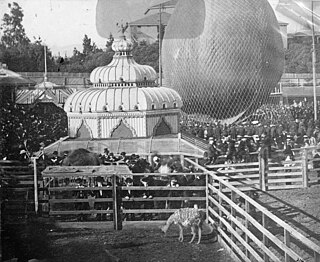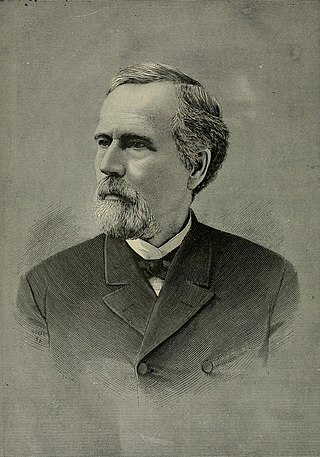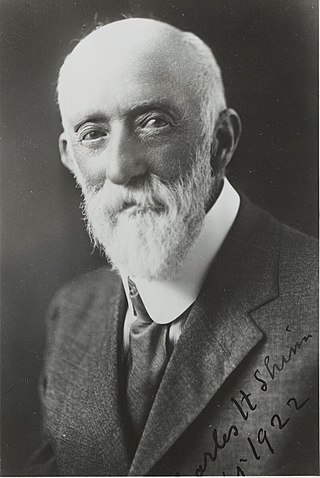Related Research Articles

David Smith Terry was an American politician and jurist who served as the fourth chief justice of the Supreme Court of California; he was an author of the state's 1879 Constitution.

The San Francisco Public Library is the public library system of the city and county of San Francisco. The Main Library is located at Civic Center, at 100 Larkin Street. The library system has won several awards, such as Library Journal's Library of the Year award in 2018. The library is well-funded due to the city's dedicated Library Preservation Fund that was established by a 1994 ballot measure, which was subsequently renewed until 2022 by a ballot measure in 2007.

William Thompson Wallace was the 12th Chief Justice of California and the 6th Attorney General of California. He served on the Supreme Court of California from 1871 to 1879 and as Attorney General from 1856 to 1858.
The San Mateo County Community College District is a community college system in California with three institutions: College of San Mateo in San Mateo, Cañada College in Redwood City, and Skyline College in San Bruno. The district serves more than 25,000 students each day with both day and evening classes.

Andrew Jackson Bryant, known as A.J. Bryant, (1831–1888) was the seventeenth mayor of San Francisco, California, serving from December 1875 to December 1879 during a lengthy economic depression that struck San Francisco and the rest of the country. Bryant was a strong advocate for an eight-hour work day as well as legislation to halt the immigration of Chinese laborers into the state. A prominent insurance man and a sportsman, he drowned in the San Francisco Bay after falling from a ferryboat.

The Oakland Public Library is the public library in Oakland, California. Opened in 1878, the Oakland Public Library currently serves the city of Oakland, along with neighboring smaller cities Emeryville and Piedmont. The Oakland Public Library has the largest collection of any public library in the East Bay, featuring approximately 1.5 million items. It consists of a main library located in downtown Oakland, and 16 branch libraries throughout the city.

The Carnegie Free Library in Eureka, California was built in Classical Revival Style in 1902. It was listed on the National Register of Historic Places in 1986, and currently houses the Morris Graves Museum of Art.
Nathaniel Bennett was one of the first Associate Justices of the California Supreme Court.

The San Francisco riot of 1877 was a three-day pogrom waged against Chinese immigrants in San Francisco, California by the city's majority white population from the evening of July 23 through the night of July 25, 1877. The ethnic violence which swept Chinatown resulted in four deaths and the destruction of more than $100,000 worth of property belonging to the city's Chinese immigrant population.

Woodward's Gardens, commonly referred to as The Gardens, was a combination amusement park, museum, art gallery, zoo, and aquarium operating from 1866 to 1891 in the Mission District of San Francisco, California. The Gardens covered two city blocks, bounded by Mission, Valencia, 13th, and 15th Streets in San Francisco. The site currently has a brick building at 1700 Mission Street, built after the 1906 San Francisco earthquake, which features a California Historical Site plaque, and the Crafty Fox Alehouse on the ground floor. The former Gardens site also features the current location of the San Francisco Armory, completed in 1914.

Thomas Bard McFarland was a miner, politician and judge in the U.S. state of California. He served as a state assemblyman, Superior Court judge, and associate justice of the Supreme Court of California.

Frederick Alonzo Bee (傅列秘) was an early opponent of Anti-Chinese sentiment in the United States. He was a California Gold Rush pioneer, miner, merchant, manager of the Pony Express, builder of the telegraph over the Sierras, developer of Sausalito, California, lobbyist for the San Francisco Chamber of Commerce, official at the Chinese Consulate, and vineyardist near Martinez, California. Bee Street in Sausalito was named after him. Bee was appointed as Consul by the Chinese government after he effectively represented the interests of the Chinese community in front of a Congressional committee and settled disputes in Chinatown. Bee acted in an official capacity to represent the interests of Chinese immigrants, and appeared in federal court cases; his efforts to preserve harmony were recognized by the Emperor of China. October, 2015 Sierra Heritage magazine featured Frederick Bee in a 4-page article written by Lj Bottjer. Sherri Bergmann wrote an article for the January 22, 2018 Mountain Democrat.

John Randolph Sharpstein was an American lawyer and judge. He was an associate justice of the Supreme Court of California for twelve years, and previously served as a member of the Wisconsin State Senate and Wisconsin State Assembly.

Charles Nelson Fox was an associate justice of the Supreme Court of California from June 25, 1889, to January 7, 1895.

Isaac Sawyer Belcher was an American attorney and an associate justice of the Supreme Court of California from March 4, 1872, to January 5, 1874.

James Dabney Thornton was an American lawyer and judge who served as associate justice of the Supreme Court of California from 1880 to 1891.

Milton Hills Myrick was an associate justice of the Supreme Court of California from January 5, 1880 to January 3, 1887.

Oriental Public School, founded as The Chinese School, was a public school located in Chinatown, San Francisco, California. It was initially set up in 1859 as a segregated school for schoolchildren of Chinese descent, part of the growing anti-Chinese sentiment in the United States that arose in the late 1800s. The school has been renamed a number of times, most recently in 1998 to the Gordon J. Lau Elementary School in honor of the city's first Chinese-American supervisor.

Rancho Las Camaritas was an Alta California 18.57 acres land grant to José de Jesús Noé on January 21, 1840 by Governor Juan Bautista Alvarado. Millions of acres of California land was given at no charge to men between 1784 and 1846 by the Spanish (1784–1810) or Mexican governments (1819–1846) mostly for military service to raise cattle on. About 300 of the 800 Land grants were sizable varying from a few thousand to 1.5 million acres – see List of ranchos of California for the larger grants. Following the Mexican–American War, the land grants were challenged with most of them falling into American hands. Only one land grant has remained undeveloped. Las Camaritas' ownership was disputed in court by the U.S. government from 1856 until 1882 due to conflicting documentation presented by its American owner Ferdinand Vassault after a string of sales initiated by Jose Noe sometime between 1842 and 1846.

Charles Howard Shinn was a horticulturalist, author, inspector of California Experiment Stations, and forest ranger in California.
References
- ↑ Daily Journal of the California Legislature-Assembly: Twenty-Second Session (PDF) (Report). California Secretary of State. 1878. Retrieved 29 November 2018.
Senate Bill No. 1—An Act to establish and maintain free public libraries and reading-rooms. Read third time, and passed, Title approved.
- 1 2 Nye, Matthew. "National City Public Library: An Early History". The Journal of San Diego History: 205, 213.
- ↑ "History". Oakland Public Library. November 10, 2005. Archived from the original on 12 June 2009. Retrieved 30 June 2012.
- 1 2 "The Free Library". Pacific Appeal. March 23, 1878. Retrieved 29 November 2018.
- 1 2 "A Free Public Library". Daily Alta California. August 5, 1877. Retrieved 29 November 2018.
- 1 2 "Free Public Library". Daily Alta California. August 4, 1877. Retrieved 29 November 2018.
- ↑ "The good news is that libraries are alive and thriving". California Association of Library Trustees And Commissioners. 2007. Retrieved 30 June 2012.
- ↑ "Local Briefs". Tocsin. 19 April 1879. Retrieved 29 November 2018.
- ↑ "The Free Library". Sacramento Daily Union. 16 June 1879. Retrieved 29 November 2018.